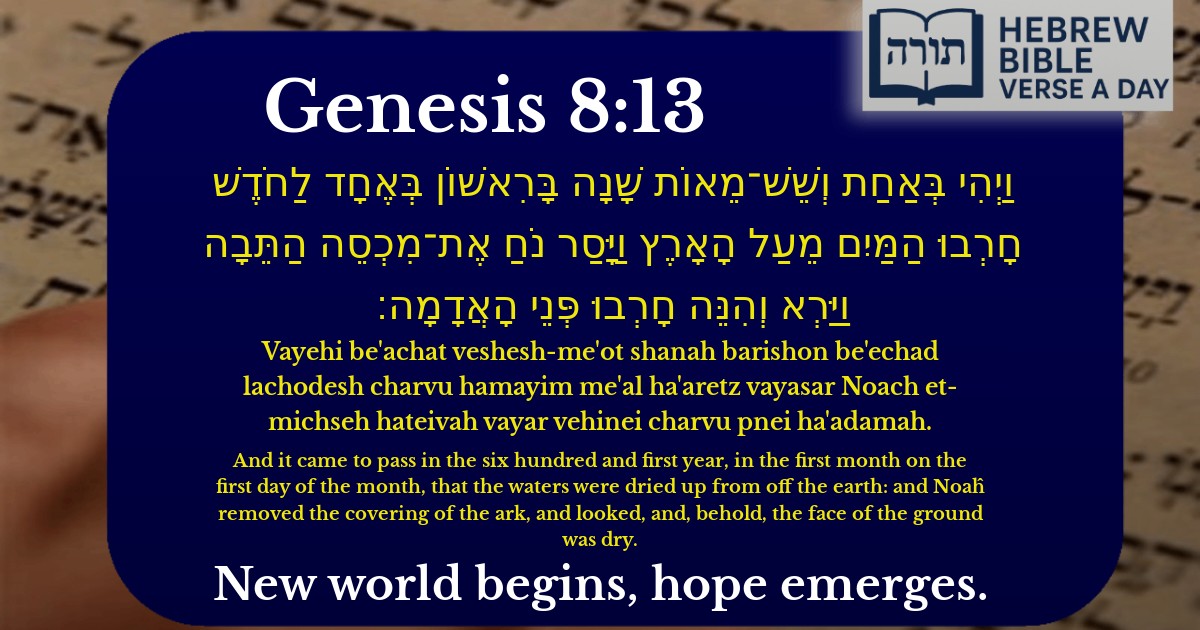Join Our Newsletter To Be Informed When New Videos Are Posted
Join the thousands of fellow Studends who rely on our videos to learn how to read the bible in Hebrew for free!
Hebrew Text
וַיְהִי בְּאַחַת וְשֵׁשׁ־מֵאוֹת שָׁנָה בָּרִאשׁוֹן בְּאֶחָד לַחֹדֶשׁ חָרְבוּ הַמַּיִם מֵעַל הָאָרֶץ וַיָּסַר נֹחַ אֶת־מִכְסֵה הַתֵּבָה וַיַּרְא וְהִנֵּה חָרְבוּ פְּנֵי הָאֲדָמָה׃
English Translation
And it came to pass in the six hundred and first year, in the first month on the first day of the month, that the waters were dried up from off the earth: and Noaĥ removed the covering of the ark, and looked, and, behold, the face of the ground was dry.
Transliteration
Vayehi be'achat veshesh-me'ot shanah barishon be'echad lachodesh charvu hamayim me'al ha'aretz vayasar Noach et-michseh hateivah vayar vehinei charvu pnei ha'adamah.
Hebrew Leining Text
וַ֠יְהִ֠י בְּאַחַ֨ת וְשֵׁשׁ־מֵא֜וֹת שָׁנָ֗ה בָּֽרִאשׁוֹן֙ בְּאֶחָ֣ד לַחֹ֔דֶשׁ חָֽרְב֥וּ הַמַּ֖יִם מֵעַ֣ל הָאָ֑רֶץ וַיָּ֤סַר נֹ֙חַ֙ אֶת־מִכְסֵ֣ה הַתֵּבָ֔ה וַיַּ֕רְא וְהִנֵּ֥ה חָֽרְב֖וּ פְּנֵ֥י הָֽאֲדָמָֽה׃
וַ֠יְהִ֠י בְּאַחַ֨ת וְשֵׁשׁ־מֵא֜וֹת שָׁנָ֗ה בָּֽרִאשׁוֹן֙ בְּאֶחָ֣ד לַחֹ֔דֶשׁ חָֽרְב֥וּ הַמַּ֖יִם מֵעַ֣ל הָאָ֑רֶץ וַיָּ֤סַר נֹ֙חַ֙ אֶת־מִכְסֵ֣ה הַתֵּבָ֔ה וַיַּ֕רְא וְהִנֵּ֥ה חָֽרְב֖וּ פְּנֵ֥י הָֽאֲדָמָֽה׃
🎵 Listen to leining
Parasha Commentary
📚 Talmud Citations
This verse is not quoted in the Talmud.


The Timing of the Waters' Recession
The verse states that the waters dried up in the six hundred and first year of Noaḥ's life, on the first day of the first month. Rashi (Bereshit 8:13) explains that this refers to the month of Nisan, marking a new beginning for the world after the flood. The Torah emphasizes the precise date to teach that just as the redemption from Egypt occurred in Nisan, the rebirth of the world after the flood also began in this month of renewal.
Noaḥ's Removal of the Ark's Covering
Noaḥ removed the covering of the ark to assess the state of the earth. The Midrash (Bereshit Rabbah 33:7) notes that Noaḥ acted with caution—he did not immediately leave the ark but first inspected the land. This demonstrates his wisdom and patience, as he waited for a clear sign from Hashem before disembarking. Ramban (Bereshit 8:13) adds that Noaḥ's actions reflect his trust in divine timing rather than rushing ahead based on his own assumptions.
The Condition of the Earth
The phrase "חָרְבוּ פְּנֵי הָאֲדָמָה" ("the face of the ground was dry") indicates that while the surface was dry, the earth was not yet fully restored. Ibn Ezra (Bereshit 8:13) explains that complete recovery took additional time, as the verse later states (8:14) that the earth was entirely dry by the 27th of the second month. This teaches that natural processes, even after miracles, often follow gradual progression.
Spiritual Lessons from the Verse